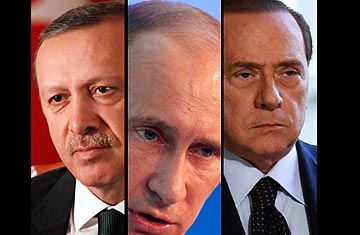
From left: Turkey's Recep Tayyip Erdogan, Russia's Vladimir Putin and Italy's Silvio Berlusconi
Talking Turkey
Of all the countries mentioned in the diplomatic cables published by WikiLeaks, none feature more prominently than Turkey. With references to Ankara appearing in 7,918 documents, the leak contains more documents coming from Turkey than any other nation — and none of them are flattering.
The documents lay bare the skepticism of U.S. diplomats toward Turkish Prime Minister Recep Tayyip Erdogan and his Islamic-rooted government. Erdogan is reportedly described by U.S. diplomats as an autocratic Islamist who presents himself as the "Tribune of Anatolia" and surrounds himself with an "iron ring of sycophantic (but contemptuous) advisors" who have little understanding of the world beyond Ankara. One cable accuses the Prime Minister of "overbearing pride," "unbridled ambition stemming from the belief God has anointed him to lead Turkey" and "an overweening desire to stay in power which, despite his macho image, renders him fearful and prone to temporizing even at moments which call for swift and resolute decisions." The documents also contain allegations of corruption within Erdogan's government, with claims that the Prime Minister has eight Swiss bank accounts.
Meanwhile, Foreign Minister Ahmet Davutoglu is called "extremely dangerous" because of his neo-Ottoman ambitions, and in one cable, his approach to policy is dismissively described as having the ambition of a Rolls-Royce and the resources of a Rover.
In Turkey, the media and the blogosphere are gripped by the allegations — as soon as the leaks became available, a group of volunteers began translating the documents into Turkish and posting them online at WikiLeaksTR. The mainstream daily Aksam dubbed the dump "The September 11 of Diplomacy"; the country's top-selling daily, Hurriyet, called it "An Earthquake Centered in Ankara."
For his part, Erdogan has said it is too early to comment. "First let's see what's [in the documents]. Then we will see which of these are serious or not, because WikiLeaks' reliability is in doubt," he said to reporters before leaving for an E.U.-Africa summit in Tripoli, Libya. "After that, we will evaluate them and make the necessary comment."
When contacted by TIME, a spokesman for the Foreign Ministry simply said, "We are evaluating the documents."
Italy's Wild Child
In Italy, Prime Minister Silvio Berlusconi — described in one cable as "feckless, vain, and ineffective as a modern European leader" — laughed off the scandal as nothing new. "I don't pay attention to the revelations of third- or fourth-tier functionaries, which then get reported in left-wing newspapers," he said on Monday, speaking to reporters at the E.U.-Africa summit.
But the descriptions of Berlusconi, which paint him as a carousing confidant of Russian Prime Minister Vladimir Putin, are sure to reinforce accusations by the opposition that his lavish, unorthodox lifestyle is dragging down the country's reputation. One cable says he is "physically and politically weak," adding that "[his] frequent late nights and penchant for partying hard mean he does not get sufficient rest."
Berlusconi, who has been embroiled in a series of scandals involving underage women, denied on Monday that he hosts wild parties: "Once a month, I host dinners in my homes where everything happens in a correct, dignified and elegant way." But he agreed with his political opponents on one thing: the revelations don't make Italy look good. "The things that are being said are hurting the image of our country," he said.
Russia Shrugs
Despite WikiLeaks' promise last month to teach Russians "a lot about their country," Cablegate has left the Russian government relatively unscathed. Putin even got a boost to his macho image, thanks to some of the cables from the U.S. embassy in Moscow, which call him an "alpha dog" and say (to no one's particular surprise) that President Dmitri Medvedev "plays Robin to Putin's Batman." On Monday, Foreign Minister Sergei Lavrov called the documents an "amusing read" that would in no way guide Russian policy toward the U.S.
Over at the Kremlin, the press office was playing it equally cool. "Made-up Hollywood characters hardly deserve comment," Medvedev spokeswoman Natalia Timakova told Russian news agencies, apparently trying to downplay the Batman-Robin jab at her boss. Russian lawmakers also rushed to assure the U.S. that there are no hard feelings. Even nationalist party leader Vladimir Zhirinovsky, who in the past has savored the chance to badmouth the U.S., decided this time to play nice, saying to reporters, "[President Ronald] Reagan gave us a much harsher rating when he called our country 'the evil empire.' "
